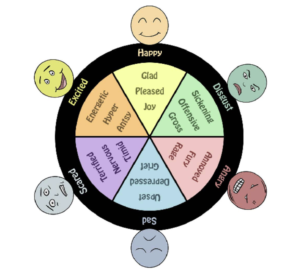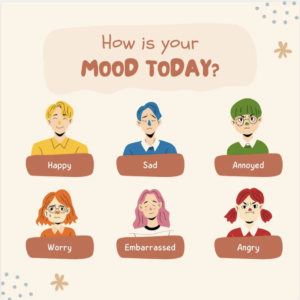What Are Emotions?
Emotions are complex feelings we experience every day. For kids, this might be happiness when they play with their friends, sadness when their favorite toy breaks, or anger when things don’t go their way. For teenagers, emotions could include joy when they accomplish something, frustration when they argue with a friend, or anxiety before a big game. Emotions are a natural part of human beings and they play a crucial role in how we interact with the world.

Why Are Emotions Important?
Emotions help us understand ourselves and our reactions to different situations. They can motivate us to take action, communicate our needs, and connect with others.
Why Emotional Intelligence Matters
Emotional intelligence is the ability to recognize, understand, and manage our own emotions, as well as understand and influence the emotions of others. For children and teenagers, developing emotional intelligence is important for building healthy relationships, making right decisions, and achieving personal and academic success.

Common Emotions and How to Handle Them
For Kids:
Happiness: Encourage your child to share their joy with others. Smile, laugh, and celebrate positive moments together.
Sadness: It’s okay for your child to feel sad sometimes. Encourage them to talk to someone they trust and share their feelings.
Anger: When your child is angry, teach them to take deep breaths or count to ten to calm down. Suggest finding a quiet place to relax.
Fear: If your child is scared, help them talk about their fears. Understanding what makes them afraid can make it less scary.
For Teens:
Joy: Encourage your teen to share their happiness with friends and family. Celebrate their successes and savor positive moments.
Sadness: It’s okay for your teen to feel down sometimes. Encourage them to reach out to someone they trust and talk about what’s bothering them.
Anger: When your teen is angry, suggest taking deep breaths, going for a walk, or finding a quiet place to cool down. Writing in a journal can also help process their feelings.
Anxiety: When your teen feels anxious, teach them mindfulness or relaxation techniques. Focus on their breathing, or suggest activities like yoga or listening to calming music.
Activities to Help Kids and Teens Understand Emotions
For Kids:
Emotion Wheel: Help your child draw a circle and divide it into sections. Label each section with a different emotion and draw a face that shows that emotion. Kids can use the emotion wheel to connect and identify emotions. This helps them recognize and name their feelings.

Image Source: https://www.therapistaid.com/
Story Time: Read stories where characters experience different emotions. Discuss how the characters feel and why.

————————————————————-
For Teens:
Emotion Journal: Encourage your teen to keep a daily journal to track their emotions. They can write about what happened, how they felt, and what they did to cope. This helps them recognize patterns and understand their emotional triggers.

Mindfulness Exercises: Introduce your teen to mindfulness to stay present and aware of their emotions. Apps like “Headspace” or “Calm” offer guided exercises specifically for teens.

————————————————————-
Practical Solutions and Examples
Family Meetings: Hold regular family meetings where everyone can share their feelings and discuss any issues in a safe and supportive environment.
Scenario Role-Playing: Practice handling different emotions through role-playing. For example, simulate a stressful situation and demonstrate effective coping mechanisms.
Positive Reinforcement: Acknowledge and praise your child or teen when they manage their emotions well. Positive reinforcement encourages them to continue using healthy strategies.
Lead by Example: Parents can lead by example by openly sharing their own feelings, showing effective communication, and demonstrating how they manage their emotions in various scenarios. Modeling healthy emotional habits helps children and teens learn by observing and following their parents.

By understanding and managing emotions, both kids and teenagers can develop better emotional intelligence, leading to healthier relationships, improved decision-making, and greater overall well-being. Emotional intelligence is just one of many essential skills that can help children and teenagers become emotionally strong. Parents play a crucial role in guiding and supporting their children through these important developmental stages, but connecting with a mentor or life coach can provide the personalized guidance and support needed to navigate their emotional growth effectively. Join us to help your child build emotional strength and achieve their full potential.
Write us to: [email protected]
Picture Courtesy: Pixabay & Google Images

